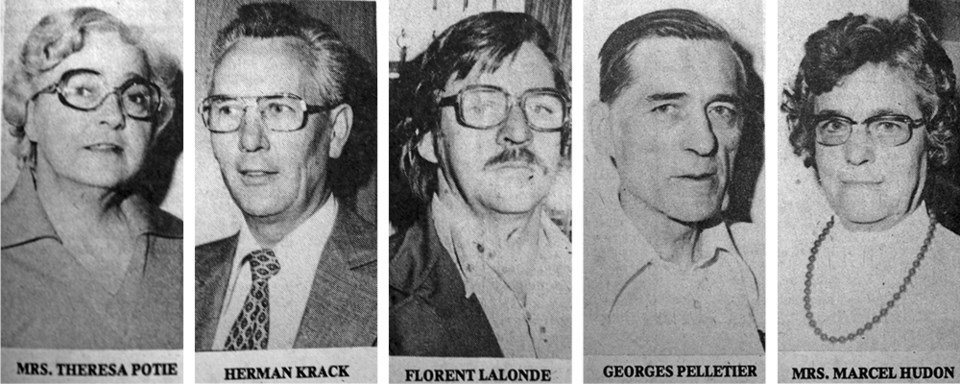The separation of Québec from the rest of Canada would be harmful both to that province and to the nine remaining provinces. This was the consensus among four French-speaking and one English-speaking Canadian interviewed in Zenon Park last week.
Mrs. Theresa Potie noted that the separation of Québec would be harmful for the minority French-speaking population outside of Québec.
“We would lose everything we have now,” Mrs. Potie said.
Florent Lalonde, a garage operator in the village and George Pelletier, the owner of a grocery store in the same community both felt that economically the separation of Québec would not be feasible. Herman Krack, manager of the Zenon Park Credit Union and the only English-speaking Canadian interviewed, felt that economically Québec needed the rest of the country more than Canada needed it.
All interviewed felt that the Québecers had voted not for separation but for ‘better government.’ Mrs. Marcel Hudon said that a sister living in Québec had written that, during the election campaign, the question of separation was not a major issue. It was only when the Parti Québecois was elected, she wrote, that the separation issue made the headlines.
As to whether the people of Québec would vote for separation or against it, the five interviewed were uncertain. Mrs. Hudon noted that to men like René Lévesque the chasm between English and French speaking Canadians is so great that the only answer is the separation of Québec. Mr. Pelletier noted that the federal government would have to take a hard look at how the British North America Act affects all Canadian provinces not just Québec. He felt the government would have to "bend over backwards" to keep Canada a united country.
The French Canadians interviewed maintained that they did not feel on the whole that they had been treated as second class citizens because they were French-speaking. Mr. Lalonde and Mrs. Hudon both noted that being bilingual was an advantage for them. In travel, Mr. Lalonde said, he found his bilingualism helpful. Mrs. Potie felt that in the last 20 years there had been a change in the way French Canadians were regarded by the English-speaking population.
During her school days, Mrs. Potie said, they had a superintendent who became very angry if he heard French spoken on the playground. He encouraged them to speak only English. Today in Zenon Park from Kindergarten up the children are instructed in both English and French.
French is spoken regularly in the homes of the four people interviewed. Their children were all bilingual and each felt they would pass their mother tongue on to their children. However, they were all worried that their language was becoming more and more eroded by English.
A paradoxical situation exists, Mrs. Pelletier pointed out. Today, there seems to be an increased awareness among the young that they must preserve their heritage through their language. However, as Mrs. Hudon said, Zenon Park is a French speaking island surrounded by English speaking peoples. The young leave their community, in many cases marrying English speaking Canadians and use their own language less and less.
Mr. Pelletier felt that television had been responsible in part for the erosion of the French language. Children today, he said, speak English before they enter school. He himself spoke only French at that time. Mr. Lalonde noted that his children speak English frequently at home and he finds himself speaking that language.
Mrs. Hudon felt that, to preserve their language, the Zenon Park people must use it more outside of their community. If people became accustomed to hearing French spoken, she reasoned, perhaps it would survive.
Business transactions in the Credit Union are conducted in English, according to Mr. Krack. He said neither he nor the board had received any complaints about this. Mr. Lalonde said that, while he may discuss the sale of a car with a customer in French, the deal will be closed in English and the correspondence will be in English. Mr. Pelletier said in his store, business transactions are based on the language spoken by the customer.
While all interviewed maintained that French speaking Canadians had the right to retain their own language, no one felt that in the west individuals should be forced to speak to them in French. Mr. Pelletier noted that he felt that forcing anyone to speak French would be an intrusion on basic human rights. However, everyone agreed that it would not harm Canadians to be bilingual. As Mrs. Hudon noted, being able to speak more than one language adds ‘polish’ to individuals. Mrs. Potie pointed out that. in European countries, children are taught three or four languages.
Mrs. Hudon summed up her feelings by saying the learning of the French language should not be done for political reasons but for educational reasons and as a gesture of well-meaning and understanding on the part of English-speaking Canadians towards French Canadians.
The introduction of the French language into the curriculum of elements, schools was, those interviewed agreed. a positive step towards making Canada a truly bilingual nation. Children learn easily, Mr. Pelletier noted. Mrs. Hudon stated the young would have no bias against either language and therefore would learn easily. Mr. Krack noted that by attending high school in Zenon Park his own children had learned some French. Zenon Park children are taught both French and English in their school.
When asked if they would ever consider leaving Saskatchewan to go to Québec, should that province become a separate nation, all replied with an emphatic no. This is their home, they stated, and while they like to visit in Québec, they do not consider it home.
“I am a true Canadian,” was how Mrs. Hudon summed up her feelings about the possibility of Québec separation.




